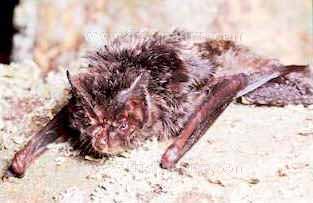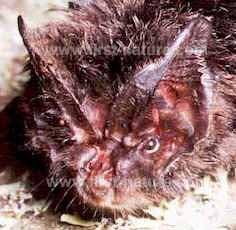Barbastella barbastellus - Barbastelle Bat
Phylum: Chordata - Class: Mammalia - Order: Chiroptera - Family: Vespertilionidae

Barbastelle Bats are quite rare in Britain and indeed across most of Europe, but they are found albeit in small numbers in southern England and Wales. These bats are of medium size, having a wingspan of 26 - 29cm, a head-and-body length of 4 to 5.5cm and a weight of 6 - 13gm.
A distinguishing feature of this species is its very broad ears, joined at the top of its head; it also has a very blunt pug-like face.
Habitat and flight
You may see Barbastelle Bats along wooded river valleys and along lake shores, where they fly low over the water and dip down occasionally to drink. Barbastelles often emerge before dark and fly in the deep shade of woodland edges until open areas are dark enough for their safety.
Feeding
Barbastelle Bats feed mainly on night-flying micro moths, but they also eat small beetles and other insects.
Roosts

In summer Barbastelle Bats are sometimes found roosting in hollow trees and in buildings, but little is known about the location of their maternity colonies.
Although the winter roosting sites of Barbastelle Bats are also something of a mystery, they have been found in cold underground sites, where they generally hang free. Barbastelles have also been found occasionally in winter roosts among tree roots.
Reproduction
Barbastelles are so rare in Britain that most of our understanding of their breeding behaviour is inferred from observations made in mainland Europe. Female generally reach maturity at the age of about two years, and they produce one or occasionally two offspring in July or early August. The young are able to fly after about three weeks, and by the age of six weeks they are sufficiently proficient at catching micro moths to feed themselves independently of their mothers.
This rare bat is a UK Biodiversity Action Plan (UK-BAP) species and, as with other bats, it has special protection in law.
Please Help Us: If you have found this information interesting and useful, please consider helping to keep First Nature online by making a small donation towards the web hosting and internet costs.
Any donations over and above the essential running costs will help support the conservation work of Plantlife, the Rivers Trust and charitable botanic gardens - as do author royalties and publisher proceeds from books by Pat and Sue.